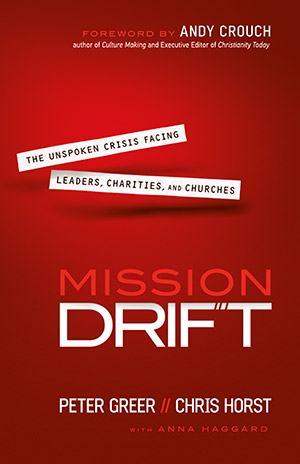Just a year later, writing alongside co-author Chris Horst, he’s released another book, Mission Drift — this time focusing on the spiritual risks faced by Christian organizations, churches, and the leaders who drive their missions. Their thesis: “Without careful attention, faith-based organizations will inevitably drift from their founding mission.” Assuming such organizations are founded out of obedience to God, such missions are not, of course, ours for the drifting.
Highlighting a number of cases, from Yale University to ChildFund to the YMCA, as well as the struggles they’ve faced at their own organization (HOPE International), Greer and Horst demonstrate that it is all too common and convenient for Christian organizations to move toward whole-scale secularization. Such a digression is the “natural course,” they argue, and without the proper foundation, safeguards, and determination, “drift is only a matter of time.”
Yet it is not inevitable. Thus, in an effort to help others prevent such a course, the bulk of the book focuses on how organizations can stay “Mission True” — serving, adapting, and growing without changing their God-given identity. “Mission True organizations know why they exist and protect their core at all costs,” they write. “They remain faithful to what they believe God has entrusted them to do. They define what is immutable: their values and purposes, their DNA, their heart and soul.”
Conducting extensive research across a variety of sectors, and drawing heavily on case studies and personal stories, Greer and Horst proceed to offer 13 key distinguishers of Mission True organizations, with topics ranging from visioning to accountability to board-member politics to the daily rituals and practices necessary for staying on course. Each offers remarkable wisdom and an array of practical guidance, but the first of the 13 is crucial for understanding all the rest: “Mission True organizations believe the Gospel is their most precious asset.”
Indeed, staying Mission True isn’t important simply for the sake of staying Mission True — conserving for the sake of conserving. It’s important because, as Christians, we believe the Gospel transforms all that we do. Our prophetic witness must witness to something. Word is inextricably linked to deed. Before we take the necessary steps to protect and reinforce our Christian identity and purpose, we need to reach a full understanding of how everything we do hinges on the Gospel.
Using the problem of poverty as an example — an issue that’s at the forefront for many Christian organizations — the authors note that even if “mission-drifted” organizations are able to achieve poverty alleviation at some broad or overarching level, “apart from Christ, we might simply introduce the problems of prosperity while we solve the problems of poverty.”
The Christian organization, unlike the secular, is called to reach “beyond humanitarianism,” they write. Or, as one might expand upon it, beyond profit, beyond education, and beyond physical health:
Where secular organizations place their faith in the human person, religious organizations recognize that human persons—divorced from God—can never truly deal with the problems most fundamental to human society. Poverty may be alleviated, but prosperity brings its fair share of problems along with it…”Aid” divorced from the context of faith fails to deal with humanity’s most basic problem. Secular relief is just that—relief; it does not and cannot address those issues that are most fundamental to the human condition…
If we are called by God to serve a particular area and particular people, equipped with a particular vision and mission for that particular form of service, the basic direction of our worship and the fundamental alignment of our hearts is bound to impact the nature, orientation, and impact of the work itself.
Many Christians know and understand this at a fundamental level. As the authors observe, “most organizations have not willingly, consciously, changed direction” or “volitionally chosen to soften their Christian distinctiveness.” Yet drift is happening, and it seems increasingly prevalent given the various tugs of modernity and secularization.
This book comes as a helpful and timely reminder that when boots hit the ground, hands get dirty, and donors, customers, and congregants get picky, it can be far too easy to neglect or forget both the origin and end of our efforts. I’m thankful for the wisdom and empowerment this book provides in mitigating that risk, and I highly recommend it.
[product sku=”1162″]
